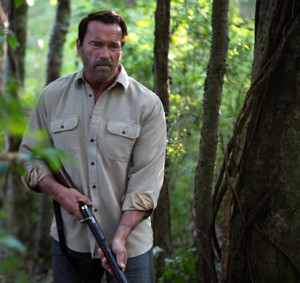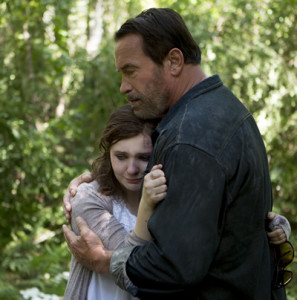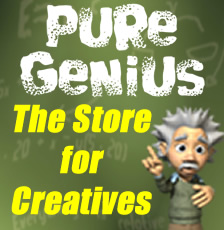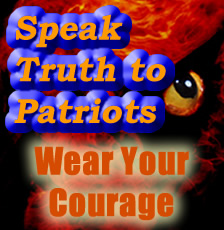Arnold Schwarzenegger – Zombie’s Father in ‘Maggie’
(Originally published on Blogcritics.org)
My brain’s cynicism synapse snapped when I heard that a new Arnold Schwarzenegger zombie movie was opening at the prestigious Tribeca Film Festival. Somebody’s been bribed, I thought. Not the case. Maggie is not your father’s Arnold movie or zombie movie for that matter. It is a touching examination of the relationship between a father and daughter under horribly stressful and deadly conditions.
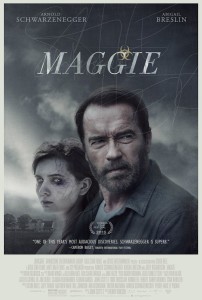 Schwarzenegger plays Wade Vogel, father of Maggie, played by Abigail Breslin (Signs, Little Miss Sunshine, Ender’s Game). Maggie’s step-mom is played by Joely Richardson (Vampire Academy,Nip/Tuck, The Patriot). The family, living in rural America, has survived a world-wide walking-dead pandemic, which authorities are bringing under control. As part of that control, people infected with the zombie disease are put in camps with other victims to die and be destroyed. The camps are rumored to be horrendous.
Schwarzenegger plays Wade Vogel, father of Maggie, played by Abigail Breslin (Signs, Little Miss Sunshine, Ender’s Game). Maggie’s step-mom is played by Joely Richardson (Vampire Academy,Nip/Tuck, The Patriot). The family, living in rural America, has survived a world-wide walking-dead pandemic, which authorities are bringing under control. As part of that control, people infected with the zombie disease are put in camps with other victims to die and be destroyed. The camps are rumored to be horrendous.
The film begins with Wade looking for his daughter. She has been bitten by a zombie and rather than endanger her Dad, step-mom and step-siblings, she tries to disappear into a nearby city. Wade finds her and brings her home. This begins the series of crises that arise with friends, family, and authorities as her condition worsens.
In production notes provided by distributor Lionsgate and Roadside Attractions, Schwarzenegger said, “When my team brought me this script and told me it was on the Black List, meaning it is one of the best scripts that hasn’t been made, I was intrigued. You’re used to seeing me play the ‘ubermensch’, the action hero bullets can’t seem to hit. In Maggie, I am the everyman, a stoic farmer dealing with the most basic concerns -‐ protecting his family, and savoring every last second with his daughter.”
This was Schwarzenegger’s first low-budget indie film (if you don’t count his 1969 debut in Hercules in New York). It was also a first feature for screenwriter John Scott (a former NASA engineer) and a debut effort for the film’s director, Henry Hobson.
The producers brought in Hobson for his visual style and artistic talents. Hobson has become known for his creative work on main and end titles for a series of major films, including Sherlock Holmes, Rango, and The Help. He has also been the main title design director for the TV series, The Walking Dead, and has done creative work on the Academy Awards broadcasts for the past six years.
As the producers’ anticipated, he created a somber, intense and very personal feel to this story world. When you go to see a “zombie movie”, you don’t expect it to feel so real and emotionally dark. The film was in color, but it almost felt like black-and-white.
Secondly, he captured the feel of small town America. We often take the anonymity of the big city as a given. In rural areas, your doctor, the police, and other officials call you by your first name, because you grew up with them or they’re your friends from church. Wade’s interaction with officialdom, which is a critical part of the plot, accurately reflects this rural familiarity.
I suspect the script for this film sat on the Blacklist for a while because it doesn’t fit one’s assumptions about zombie movies. There will not be any Maggie Action Figures, video games or advertising cross-promotions with breakfast cereals. The film is evidence that, within any genre, a good story is a story about families, relationships and love.
If you see this film, you’ll be treated to subtle and top-notch work by the cast. And, you may just leave the theater saying, “Hey, I didn’t know Arnold could act.”

